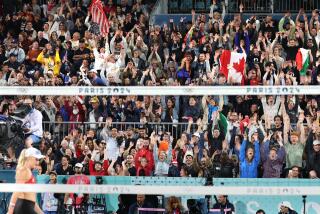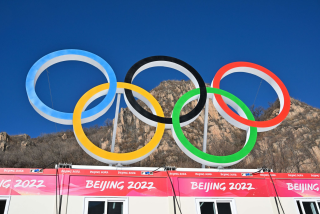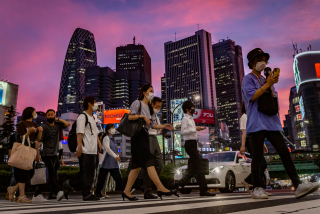Doors to Kobe, Japan Swinging Open Again
- Share via
KOBE, Japan — This port city, one of the first to welcome foreigners to Japan, will opens its doors to the world again this summer when it will be host for the World University Games.
Officials of the city of 1.4 million anticipate that more than 800,000 visitors will be present Aug. 24-Sept.4 to watch student athletes from around the globe vie for medals in 10 sports.
“Kobe was actually the city which introduced foreign culture into Japan,” said Katsumi Tashima of the Kobe Chamber of Commerce and Industry. “It has been a truly international city and we’d like to continue into the future as well.”
By the end of last month, 3,751 athletes and officials from 61 countries had filed for entry in the 13th bi-annual games, including countries that had boycotted the 1984 Los Angeles Olympics such as the Soviet Union, North Korea and Iran.
Another 46 countries have declared their intentions to enter the games, also known as Universiade, and officials hope the event will break more than sports records in Japan’s seventh-largest city.
“We hope these games will not only be the biggest sports event in Japan but in the field of Universiade,” says Deputy Mayor Toshio Miyaoka. The 1964 Olympics in Tokyo drew 94 entry nations and the 1983 Universiade in Edmonton, Alberta, 80 countries.
Despite indications that transportation lines will be strained and hotels overcrowded during the 12-day competition, Miyaoka and other officials are confident that Kobe is ready for its debut as an international sports city.
Four years ago, the city began gearing up for the games with funds from a six-month exhibition that in turn had christened a $2.2 billion man-made island, built as part of a plan to provide more space for the city.
The Portopia Island fair drew 16 million visitors, reaped $24 million in profits and allowed Kobe to win the Universiade against such cities as Rio de Janeiro and Indianapolis.
Using these and other city funds, Kobe spent an estimated $1.3 billion on new roads, sports arenas and a subway, city officials said.
During the games, Kobe expects to spend another $30 million provided from city and state coffers, corporate donations and revenues from tickets and television rights.
Spectators will pay $24-40 for tickets to the opening and closing ceremonies, while daily tickets will cost $1.60-$8 for the 10 events--track and field, basketball, fencing, gymnastics, swimming, water polo, tennis, volleyball, soccer and judo.
One of the new facilities is the $23 million, 60,000-seat stadium set in the hills west of the city, about 12 1/2 miles from downtown. The stadium, Japan’s second largest, will be the site of opening and closing ceremonies.
Nearby is a 16-court, 2,600-seat tennis arena, while across town are two halls for gymnastics, volleyball and judo. Competition also will also be held at 14 previously existing arenas.
The outlying facilities are 25 minutes by bus from downtown, and although the subway and a new road will run to the area, organizers worry about the crowds.
“We are afraid of congestion after the games,” said Mitsuyoshi Yamada, deputy director of the city’s administration department.
Organizers also are concerned that hotel space may be inadequate for the estimated 15,000 foreign and 165,000 Japanese visitors.
Minoru Itoda, deputy secretary general of the Universiade organizing committee, said original plans were for two hotels with 1,000 beds each and one hotel with 500 beds, “but to our sorrow, they will not be finished.”
He said, however, that the committee believes Kobe’s hotels and Japanese-style inns, which can house 21,000, will be able to handle many of the foreign guests.
More to Read
Go beyond the scoreboard
Get the latest on L.A.'s teams in the daily Sports Report newsletter.
You may occasionally receive promotional content from the Los Angeles Times.






